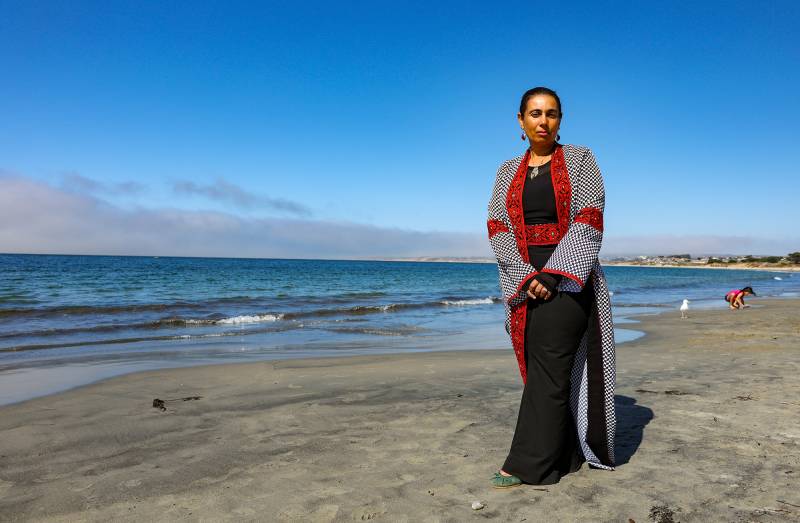Rolla Alaydi [00:01:19] It’s a mixed feeling. It’s relief and joy that it’s ceasefire. I have the feeling of fear. My name is Rolla Alaydi. Originally born in Gaza. Right now I’m in California, Pacific Grove. Like a cease fire doesn’t mean it’s the war ended. It just a little pause. You know, they pause the stop. They pause the killing any time they can go and resume and. There is a little bit of relief. And then sometimes there is so much build and accumulated of fear and worried and anxious at the end, Everything’s. Like I’ve been texting my my family like, you know, they are just holding their breath like, what if something happened and then this cease fire is no longer active or not valid anymore. Family, I talked to them. They still live in the tent, is still no education, he health system 100% destroyed does not exist anymore. But the relief that there is no bombing hour by hour. My niece, she’s 17. Her name is Rolla. They named her after me. Three hours before they announced the cease fire, she got shot in the stomach and the bullets came from the neck, the front of stomach to the back. She was living in the tent. She survived. She got some stitches. Like for the last three days, I was having that worried constant worry. My aunt Zainab. Her home got bombed and she got killed, along with her husband and her family. It was one hour before the cease fire took place. So I’m just a little bit relief, but I’m overwhelmed, you know. The whole Gaza is is in the condition of uncertainty. It’s been 15 months and I’m the only one who support my family financially. I think I’m going to continue through this. You know, things does not change within like a magic touch. It’s not like permanent. And that’s give me even more worried. Like I’m racing with the time. Like are they going to open the borders? Are they going to allow people to travel? So I’m still in that fear and that worry and in that stage of uncertainty. And I want them to leave the genocide war zone. Trump being in the new presidency terms, even the little hope that I have, it’s gone, you know, But I just want them to get like, you know, to other place that’s relatively safe. But that hope of coming to the US, it’s just it’s just vanished. I hope the cease fire will turn out to be like more permanent, more rebuild of Gaza. And for people like, you know, to have the sense of of normality again. Without community, I can’t do it by myself. So I still, like, need the full support of my community and they are doing it.
Nafez Abo-Elreich [00:05:09] I was happy for the ceasefire at least to end the misery for a lot of people there. A lot of people like my my family, a lot of families there. They got to go back to their house to find nothing. My name is Nafez Abo-Elrich, and I live in Fresno, California. Since I’m trying to remember December 20th, 23, should they live in a tent with my brother and his wife, his kid and his daughter and have kids? My brother has a big family, six kids, and some of them are married and they have the grandkids. So they were living in a miserable situation. Of course, no water, no running water, no bathrooms. They’re going to pick up their tents and go back, Like my sister said today. She talked to me today. And I want to my sister, she said that I would love to go and just stay in the ruin of my house. And it’s a tent in there and stay in it better than the miseries we are living in right now. I hope everybody goes there and find their loved one. Save their property is in good condition, at least livable condition. But from the pictures I have seen, I do not think at least I know that my sister’s two of them. Their houses are gone to pieces. That their houses are gone. My three nephews, their houses are gone. So it’s a challenge for them. What we have to do is just get together and maybe our family home still standing by. That sustained a lot of damage, but it’s fixable at that. You know, it’s livable. It’s not that bad. But let’s keep in mind, there is no running water, no power, no sewage running sewage, no electricity, no phones, no Internet there, no food. So far, no gas for cooking. So it’s it’s a challenge for them. But and other and they’re happy that there is a cease fire and they’re going back to their houses.

